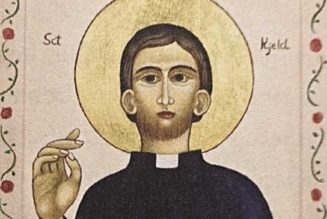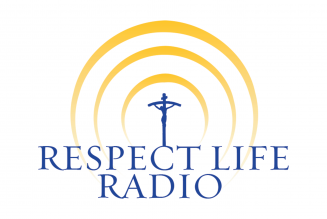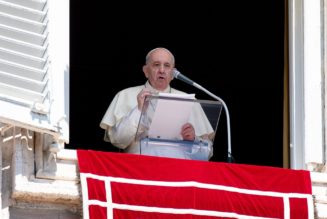, July 22, 2021

In the Gospel for the 17th Sunday of Ordinary Time Year B, a boy generously offers two loaves of cheap bread and five small fish to Jesus.
Jesus takes them and performs a miracle so great it is the only one told in all four Gospels and its ramifications have spread across time and space to reach every Christian through history to today.
Did the boy anticipate a miracle, or did he just place Jesus as a higher priority than himself? Or do the two amount to the same thing?
The story picks up where we left it last Sunday, with a crowd following Jesus at the moment he was seeking rest. In John’s telling, Jesus “went up to a mountain,” and when he saw the large crowd heading his way said to Philip, “Where can we buy enough food for them to eat?”
He wants Philip to spell out the problem, and he does: “Two hundred days’ wages worth of food would not be enough for each of them to have a little.”
But then a boy steps forward with five loaves and two fish. Notice two things here: First, even though Andrew says, “But what good are these for so many?” he nonetheless has (barely) enough faith to think that bringing this boy and his paltry offering to the Lord is not a waste of time.
Second, think of the boy! He is hungry for dinner and has enough for himself, but gives all of it to Jesus. What was he thinking?
The mysterious way Jesus completes the miracle reveals to his Apostles who he is in a very personal way.
Jesus multiplies the loaves and fishes — or perhaps makes the same ones appear in many places in an act of “multi-location,” as Frank Sheed suggests —by having the people recline and distributing them through the apostles.
First, this shows something important to his fisherman apostles. They used to spend hours dragging the lake for a few fish. Then when they followed Jesus’s instructions, they dragged a lot of fish from the lake right away. Now they see how God’s grace can skip their work altogether and just deliver its fruits.
It is like a reversal of the curse of Adam. That is even clearer in the multiplication of the bread. After the fall, God told Adam, “cursed is the ground because of you; in toil you shall eat of it all the days of your life … In the sweat of your face you shall eat bread.”
Not only does Jesus effortlessly feed the crowd in the Gospel, but he says, “Gather the fragments left over, so that nothing will be wasted.” Just as in the First Reading, where Elisha multiplied more loaves for fewer people, in the Gospel Jesus provided too much for his much larger crowd of 5,000 families (because “families” is what “5,000 men, besides women and children” means).
The Gospel says Jesus “gave thanks” for the loaves. He very well may have used the ancient Jewish prayer, “Blessed art thou, Lord, our God, King of the universe, who brings forth bread from the earth.” That prayer makes clear that Jesus multiplying the bread is only a sped-up version of what God always does.
This Gospel takes place at Passover time, in April, when the spring rains were multiplying everything everywhere. Every spring we see how God always makes too much, even in the natural realm. Think of it: Life on earth is too much — too much undergrowth, too many vines such that they cover the bushes, cats having too many kittens, too many birds chattering outside and too many rodents trying to get in and too many bugs crawling everywhere. Or go back further: The big bang resulted in way more than was necessary — too many galaxies, too many stars, too many planets; it is all too much.
But none of the extra is wasted. The plants replenish the air, the kittens take care of the excess of mice, the bugs become food for the birds who also fall prey to the cats; and the too many stars fill the sky with wonder and inspiration in a vast nightly icon of God’s grand gesture of giving us way too much.
But the generosity of our natural laws is nothing compared to the “super-substantial” bread Jesus’s miracle points to.
“Give us this day, our supersubstantial bread” says the prayer. We don’t know exactly what that means, but think of it: The one who fasted in the desert multiplies loaves; the one who told the devil we don’t live by bread alone nonetheless gives us bread. His life is filled with that ironic mismatch where human lack and divine generosity coincide. He who said “I thirst” for souls quenches our thirst for him like a “spring welling up within us.” The man of sorrows who was misunderstood thoroughly understands us. He agonized for our sins so that we could feel sweet release, he carried the cross but promised our burden would be light; he accepted his death while offering us “life to the full.”
We give him too little and he gives us too much. God has done that throughout salvation history. He gave us not just one prophet, but many; not just one covenant, but several; many kings, many priests, each showing how far they fall short of him. Now, we get one Jesus Christ, but we meet him in his sacraments multiplied by the number of priests, each of whom is an alter Christus, another Christ, for us.
It is overwhelming, and St. Paul, the prophet of the overwhelming generosity of Christ, expresses it best. In the Second Reading he says from prison that there is “one body and one Spirit, as you were also called to the one hope of your call; one Lord, one faith, one baptism; one God and Father of all, who is over all and through all and in all.”
There is one body, in many tabernacles; Jesus lifting one host, at many altars; one love, in many hearts; one way, one truth, one life, in many individual vocations.
And, in this Sunday’s Gospel, the multiplication of these abundant graces all starts with one boy.
Jesus said about the woman who anointed him, “Truly, I say to you, wherever the gospel is preached in the whole world, what she has done will be told in memory of her.” But that statement is even more true of this boy.
In this Gospel, he is the stand-in for laypeople like me. Behind him is the vast crowd, sheep without a shepherd, hungry and helpless. In front of him are the Apostles, representing the hierarchical Church, who can’t get their act together and can’t scrape enough faith together to confidently trust in God. And then there is Jesus, who sits in the center of it all, the one everyone is there to see.
The boy who has so very little steps forward. The fish he had were probably small, more like sardines. The bread loaves were cheaply made, from barley. It would have been absurd for the boy to give all he had to the bumbling, weak Church.
But he turns with love and hope and faith to Jesus, and Jesus uses his generosity to reveal himself as the Second Person of the Trinity, the super-abundant God.
This Sunday, people all over the world will tell the boy’s story and marvel at the consequences of what he did. But the readings for this Sunday are meant to leave a question lingering in our hearts where we sit in our 21st-century congregations, sheep without a shepherd, in the hands of our own bumbling Church. Like the boy, we look to Jesus, and ask ourselves: What will I give to the Lord? And what will he to do if I give it all?
Tags: 17th Sunday in Ordinary Time Year B
, prayer, Sunday Gospel, Sunday Readings
Never miss a post! Subscribe below to our weekly newsletter.
Related
Join Our Telegram Group : Salvation & Prosperity









